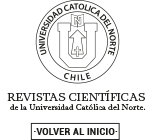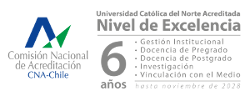Ethical standards and good practices
Revista de Derecho (Coquimbo. En línea) publishes original and unpublished works in the open-access modality, available for consultation free of charge from the journal's first issue. Therefore, it does not charge any fee for sending articles.
The journal adheres to the guidelines of COPE (Committee on Publication Ethics).
Bad practices
Procedure and penalties applicable to infringements of the ethical rules
As soon as a breach of the rules and duties set out above is suspected, the Director shall inform the author(s) and interested third parties.
They will be given a description of the inappropriate conduct and the reasons leading to its qualification. The author(s) will have a period of 15 calendar days to present their rebuttals, after which the Editorial Committee will proceed to resolve the matter, ensuring that the decision is adequately weighted, and will also verify whether the corresponding penalty is appropriate.
If the author(s) or interested parties' rebuttals or explanations fail to disprove the alleged infringement or in justifying the offending behaviour, the Drafting Committee may impose one or more of the following measures as a penalty:
a) Revocation or elimination of the published work;
b) Rejection of the work submitted to the editorial process;
c) Prohibition of publication in the journal for at least one calendar year. This period will be counted from the date of notification of the rejection or revocation of the work.
For the eventual application of any of these measures, the Editorial Committee will consider the seriousness of the event and the eventual damage to the interests of third parties.
Authorship and contribution
When the work is presented, the author(s) must clearly indicate who has contributed intellectually to the article, that is, who has participated in the conception and realisation of the work, in the writing of the text and its possible revisions, or approving the final version sent to the journal for peer review. Likewise, they must qualify those who have contributed to its elaboration in a secondary or incidental way. Having contributed to the collection of data or participated in the application of a methodology will not, by itself, be considered sufficient reasons or criteria to be considered an author. Notwithstanding that, and considering their contribution, they may be mentioned in the acknowledgements of the work.
In the case of incorporating new authors into a work already submitted, the original author and the new one will be asked to explain why the person(s) incorporated as the author(s) was not previously identified in the original submission.
In the case of withdrawal of author(s), a clarification will be requested which (via e-mail including all the interested parties) will exhaustively indicate the reasons why the person(s) was (were) originally incorporated as the author(s), in addition to the express consent of the person(s) who was originally identified as the author(s). The withdrawal of an author may be made up to 1 month after the publication of the work. After this period, no changes can be made to the authorship of a contribution.
Similarly, the original version of the article will be stored on the journal's platform, together with the second version, and a correction note will be published indicating the arguments of the author and the editorial committee that led to the modification.
Recommended good practices:
1. Clear and precise identification of the roles that each of the different participants will play in the development of the research.
2. Bear in mind the possibility of thanking people who have collaborated or participated in the research, as long as their secondary or incidental contribution is clearly identified. The organisations or institutions that contributed financially to the development of the research should also be included.
3. In cases where the incorporation of other researchers is deemed necessary, the Drafting Committee should be informed so that it may resolve as appropriate. To this end, a letter should be sent to revistaderecho@ucn.cl with a copy to all the authors of the publication, requesting the incorporation of a new researcher, which should be signed by the researcher(s) already included in the work, as well as by the new researcher(s) whose authorship is incorporated into the work. Likewise, the reason why the new researcher(s) was(were) not incorporated into the work at the moment of the presentation of the work to the Revista de Derecho (Coquimbo. En línea) must be explained. Consider that both a copy of the application and the resolution will be stored in the OJS platform.
4. Knowledge of the relevant intellectual property protection rules, and the consequences of their infringement.
5. Digital identification of every author of the submission through an ORCID number.
Complaints and appeals
Revista de Derecho (Coquimbo. En línea) has made available to all authors who submit their work for evaluation and to those who have been accepted, the e-mail address of the journal for questions, comments and observations, which may also be sent through the journal's platform.
Conflicts of interests / Competing interests
As for the author(s):
The journal requires authors to declare any legal, employment or economic affiliation that may pose a conflict of interest in connection with the submitted work.
Due to the nature of the works that may be published in the journal, it is possible that conflicting interests may arise that may affect the impartiality of the contribution selection process or the authors; therefore, each author must make an effort to identify them.
In this sense, authors must incorporate after the bibliographic references a statement of commitment, expressing clearly and concisely whether there are conflicts of interest and specify each one of them. In this statement, they must also specify the source of funding for the research, as well as the declaration of any commercial, financial or personal links that may affect the work or publishing institution.
The journal accepts no responsibility whatsoever for possible conflicts derived from the authorship of the works published.
As for the designated Evaluators:
The internal and external evaluators of the journal shall refrain from issuing the required judgement if there is a circumstance or fact that affects their objectivity and impartiality, either in relation to the work or to the author.
The following are considered to be subjective causes for abstention: family ties by blood with the author or any of the authors, work or economic ties of any kind, or particularly relevant ties of friendship or enmity, or if the author(s) of the article is/are well recognised.
The expression of a previous opinion on the work, or suggestions to the author about the object of the work, or any other previous collaboration of a scientific nature, which involves the prior formation of a judgment or violation of the principle of non-prevention, are considered objective causes of abstention.
The journal will take special care not to select evaluators who may be affected by any of the above situations.
Intellectual property
Copyright and Publication
If the work is accepted for publication, the authors will retain their copyright and guarantee the journal the right to the first publication of their work, which will simultaneously be subject to the Creative Commons Attribution 4.0 International License, which allows third parties to distribute, mix, adjust and build upon their work, even for commercial purposes, as long as the author(s) is/are indicated as the first publication in this journal.
Prohibition of plagiarism and self-plagiarism
For the purposes of this policy, originality must be considered from two perspectives: first, as the certainty that the work comes from the person who claims to be its author (plagiarism to third parties); second, that it is new and different from others previously created by the same author (self-plagiarism). The concept of plagiarism refers to the existence of a substantial copy of one's own or another's work, that is, the essential or fundamental coincidence involving a copy of phrases or paragraphs that induce the reader to deceive itself regarding the author's contributions.
It is the responsibility of the author(s) to ensure the originality of the articles contributed to the journal, as well as the veracity of the data and results included in them, expressing clearly and concisely that the contents are original and have not been copied, invented, distorted or manipulated.
In a first formal revision, the Editorial Committee will verify in the texts if any of these conducts are presented. For such effects, Revista de Derecho (Coquimbo. En línea) has a subscription to a similarity detection software.
In case of detecting some degree of plagiarism or self-plagiarism, it will be communicated to the author(s) of the work submitted for evaluation.
Recommended good practices:
Plagiarism:
1) Knowledge of the relevant intellectual property protection rules, and the consequences of their infringement.
2) Carrying out honest research, in which there is recognition of the origin of the ideas expressed in the text subject to the editorial process.
3) Respect and observance of the formal instructions that the journal has at the authors' disposal, whose objective is that the ideas expressed be known clearly and uniformly.
Self-plagiarism:
1. To inform the Editorial Committee that the work submitted is part of a project or research line, indicating its differences with other works published preliminarily.
2. When presenting the work to the Editorial Committee, highlight its original and unpublished nature, especially in cases where the work is limited to a line of research developed by the author.
3. Cite works by the author, which refer to the same line of research, to account for previous developments by the author.
4. Knowledge of the relevant intellectual property protection rules and the consequences of their infringement.
Prohibition of Parallel Submissions (redundant publication)
Parallel submission of works to another printed or electronic publication is prohibited.
Submitting a paper to the journal implies that the author assumes a commitment of exclusivity, consisting of not presenting it in parallel to other publications, either totally or partially, through any means (physical or digital). This commitment will be maintained for the duration of the editorial process.
In case this bad practice is detected, the Director reserves the right to communicate with its peer from the other journal involved and report the fact.
Recommended good practices:
1. Properly choose the seat or publication to which the work will be sent for consideration. It is recommended to use criteria such as visibility, indexing, editorial lines, etc.
2. Inform the Editorial Committee of the decision to withdraw the work from consideration, before submitting it to the editorial process of another publication
Journal management
The whole editorial process of the Revista de Derecho (Coquimbo. En Línea) is done through the OJS platform. All communication from and to the journal is done through this platform or to the institutional e-mail. For purposes of dissemination of content, the journal has official social media sites.
Peer review processes
Each of the articles received is subject to a review and selection process administered under the OJS manager. The initial study and selection of the articles is the responsibility of the Director or Editor of the Section, who accepts or rejects the originals based on the scientific quality, the alignment with the topics of the journal and the validity of the results. He or she may also request modifications and make any recommendations deemed necessary to bring the document into line with the journal's guidelines.
After this review, the article will be submitted to a double-blinded evaluation by two specialist academic peers, who may decide to:
a) approve it without changes,
b) approve it subject to minor changes (no need for a new evaluation),
c) approve it subject to major changes (re-evaluation required); and
d) reject it (not publishable in the journal).
In the event that the evaluators give substantially different opinions, a third academic peer review will be requested. The Director may resolve the difference indicated above.
The evaluation process ensures the anonymity of both authors and evaluators. The latter will have 20 working days to give their opinion. The author(s) of the article will be informed of this evaluation through the OJS platform so that it can make the necessary adjustments as requested by the evaluators. On receipt of the article with the corrections made, the journal will check that the evaluators' suggestions have been considered and analyse the justifications for those who have not.
When the adjustments and modifications are considered appropriate by the evaluators, the Editorial Coordination will communicate, through the platform, the acceptance of the work for publication.
The mentioned works will be sent within five working days to a double and external evaluation, preferably carried out by doctors or experts in the subject of the work in question, both national and foreign.
Post-publication corrections
Erratum incorporation procedure (RECTIFICATIONS)
Erratum, for the publications of the journal, must be understood as the usual method of editing after any article, through which all the errors that have been detected in an issue of the journal are corrected. This procedure must consider that if part of an article contains an error, this can be rectified later by means of an editorial note or an erratum. The corrections of errors will be made, depending on the error, in the same publication or a new version.
To request the incorporation of errata, please send an e-mail to revistaderecho@ucn.cl indicating the page/paragraph/footnote where the error is found, indicating which correction should be made by the Drafting Committee. The above may be done within six months of the publication of the paper on the journal's website.
Retraction of Authors
Authors may withdraw a paper submitted to the journal before the article is approved for review by blind reviewers.
In the case of withdrawal, the author(s), together, must raise the issue in writing to the Director of the Journal, who will present the case to the Editorial Committee. The committee must decide within 15 calendar days, and the decision will be communicated to the authors concerned. There is no appeal against this decision.
Ethical standards of Revista de Derecho (Coquimbo. En línea)
a. Responsibilities of the Editor (in charge of the general coordination of the journal), the Publishing Board and the Editorial Board.
1. The Editor, the Publishing Board and the Editorial Board are responsible for ensuring the quality of the published material, applying objective criteria at all times, and excluding any discrimination on the grounds of race, gender, sexual orientation and religious belief.
2. The Editor, the Publishing Board and the Editorial Board shall safeguard the integrity and confidentiality of the information provided by the contributors to the journal.
3. The Editor-in-Chief, Publishing Board and Editorial Board are prohibited from using unpublished material for personal, group or institutional gain without the respective consent of the relevant contributors.
4. The Editorial Board undertakes to publish corrections, clarifications, retractions or apologies, if necessary.
5. The Editorial Board guarantees the anonymity of the peer review of the material received.
6. It is the responsibility of the Editorial Board to inform authors of the results of the evaluation of their submissions in a timely manner.
b. Responsibilities of evaluators
1. The evaluators promise to apply transparent and objective criteria to their reviews and exclude any discrimination based on the collaborators' race, gender, sexual orientation, and religious beliefs.
2. The evaluators undertake to treat all material entrusted to them as confidential. The possibility of discussing or commenting on the material with third parties during the evaluation period is prohibited.
3. The evaluators will refrain from participating in the evaluation if a conflict of interest is suspected.
4. The evaluators are prohibited from using the commissioned materials during the evaluation, selection and publication periods.
c. Responsibilities of authors
1. Authors must provide a separate declaration that guarantees – if used - the reliability of the data used in the research and its recoverability from institutional repositories or from where it is stored, except for those of a confidential nature, whose declaration must be justified by the author.
2. The authors must guarantee the originality of the materials submitted. The journal does not accept works that have been previously published, regardless of the format, unless they are declared as derivative works, and their licenses are compatible with those of Revista de Derecho (Coquimbo. En línea).
3. The journal actively rejects any plagiarism, partial or total. Authors must rigorously ensure that they attribute the quotations used to their sources under the guidelines required by the journal (please refer to the instructions for publication).
4. It's the authors' sole responsibility to submit materials in the format required by the journal (see instructions for publication). The journal reserves the right to reject submissions that do not comply with its submission guidelines.
All cases not considered in this document will be resolved according to the instructions provided by COPE.




_(1).png)












